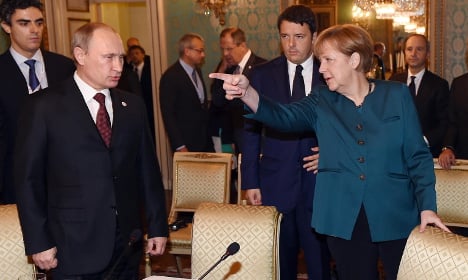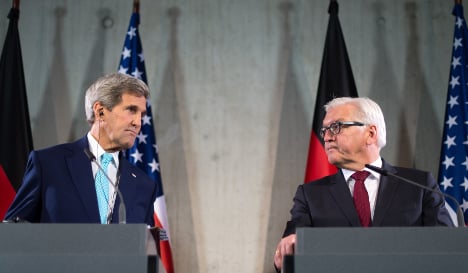Crises make Germany EU foreign policy leader
Foreign policy think-tank the European Council on Foreign Relations (ECFR) gave Germany top marks in its annual check-up of EU member states released on Thursday.
Germany ranked at the top of 17 of the 28 criteria the experts evaluated for each of the European's 28 Member States, divided into relations with five global regions (Russia, the US, wider Europe, the Middle East and North Africa and Asia), as well as multilateral issues and crisis management.
Some of the leadership roles Germany held in 2014 included developing sanctions on Russia, pushing for conclusion of the TTIP free-trade agreement with the US and acting to address the Ebola crisis.
“Standing up to Russia was the make-or-break issue in 2014,” the ECFR experts wrote.
“It took until the end of the first half of 2014 for Berlin to fully abandon the idea that Russia's aggression [in Ukraine] could be countered with diplomatic means alone.”
After that, Germany became “the clear leader in consolidating a common sanctions policy”.

Earlier in the year, both President Joachim Gauck and Defence Minister Ursula von der Leyen had declared that Germany needed to take on more responsibility at the Munich Security Conference.
Foreign Minister Frank-Walter Steinmeier launched a foreign policy review to re-think what Germany's priorities and objectives in international affairs should be.
It concluded that “the EU is ready for more proactive foreign policy leadership from Germany,” mentioning that Berlin should be more active in Nato, lead European defence policy, direct attention to North Africa and build bridges from eastern to western EU states.
A new type of leadership?
But it was important to remember that “other member states also hope Berlin will be a cooperative, consensus-building type of leader”.
That's something Berlin and second-place Sweden have been praised for this year, compared to the “activist leadership” previously shown by the UK and France – the top scorers in 2013 – that saw those states taking initiatives without always bringing fellow EU members with them.
Patchy US relationship
Things haven't been such smooth sailing with the US, with a diplomatic spat triggered by the discovery of two CIA agents inside Germany's own foreign intelligence agency, the Bundesnachrichtendienst (BND).

That didn't stop German government ministers and officials from working hard with their US counterparts to push forward the Transatlantic Trade and Investment Partnership (TTIP), the planned US-EU free trade agreement – sometimes against public wishes.
“The challenge to TTIP is the same on both sides of the Atlantic,” the ECFR experts wrote.
“At a time of economic difficulty, mainstream politicians have found it difficult to make the case for globalization.”
Humanitarian crises
The ECFR was also keen to recognize Germany's leading humanitarian contributions to crises in the Middle East and Africa.
“The EU is among the biggest humanitarian donors ... but only Sweden and Germany have accepted significant numbers of Syrian refugees,” they write.

Germany's sending of volunteers and supplies to Ebola-hit countries in West Africa is praised, by the experts note that “by the end of [2014], Cuba had deployed more doctors to Ebola-stricken countries than had any EU member”.
Future outlook
With no clear end in sight to the Ukraine crisis or the civil war in Syria, other EU members and the wider world will still be looking to Germany to take leading roles in 2015.
But not all Germans are comfortable with their country's new-found prominence in world affairs.
The embarrassing failures of military transport planes on missions to Iraq and West Africa last year pointed to one effect of that reluctance: no politician wants to vote for an increased budget for the Bundeswehr (German military) given the public's widespread pacifism.
That has allowed the army's equipment to fall into a state of serious disrepair which could hinder German attempts to deliver aid or intervene militarily abroad.
And within the EU, Germany's economic success, resented by other countries still mired in crisis such as France, may be more of a hindrance than a help in bringing other members along with it.
Comments
See Also
Germany ranked at the top of 17 of the 28 criteria the experts evaluated for each of the European's 28 Member States, divided into relations with five global regions (Russia, the US, wider Europe, the Middle East and North Africa and Asia), as well as multilateral issues and crisis management.
Some of the leadership roles Germany held in 2014 included developing sanctions on Russia, pushing for conclusion of the TTIP free-trade agreement with the US and acting to address the Ebola crisis.
“Standing up to Russia was the make-or-break issue in 2014,” the ECFR experts wrote.
“It took until the end of the first half of 2014 for Berlin to fully abandon the idea that Russia's aggression [in Ukraine] could be countered with diplomatic means alone.”
After that, Germany became “the clear leader in consolidating a common sanctions policy”.

Earlier in the year, both President Joachim Gauck and Defence Minister Ursula von der Leyen had declared that Germany needed to take on more responsibility at the Munich Security Conference.
Foreign Minister Frank-Walter Steinmeier launched a foreign policy review to re-think what Germany's priorities and objectives in international affairs should be.
It concluded that “the EU is ready for more proactive foreign policy leadership from Germany,” mentioning that Berlin should be more active in Nato, lead European defence policy, direct attention to North Africa and build bridges from eastern to western EU states.
A new type of leadership?
But it was important to remember that “other member states also hope Berlin will be a cooperative, consensus-building type of leader”.
That's something Berlin and second-place Sweden have been praised for this year, compared to the “activist leadership” previously shown by the UK and France – the top scorers in 2013 – that saw those states taking initiatives without always bringing fellow EU members with them.
Patchy US relationship
Things haven't been such smooth sailing with the US, with a diplomatic spat triggered by the discovery of two CIA agents inside Germany's own foreign intelligence agency, the Bundesnachrichtendienst (BND).

That didn't stop German government ministers and officials from working hard with their US counterparts to push forward the Transatlantic Trade and Investment Partnership (TTIP), the planned US-EU free trade agreement – sometimes against public wishes.
“The challenge to TTIP is the same on both sides of the Atlantic,” the ECFR experts wrote.
“At a time of economic difficulty, mainstream politicians have found it difficult to make the case for globalization.”
Humanitarian crises
The ECFR was also keen to recognize Germany's leading humanitarian contributions to crises in the Middle East and Africa.
“The EU is among the biggest humanitarian donors ... but only Sweden and Germany have accepted significant numbers of Syrian refugees,” they write.

Germany's sending of volunteers and supplies to Ebola-hit countries in West Africa is praised, by the experts note that “by the end of [2014], Cuba had deployed more doctors to Ebola-stricken countries than had any EU member”.
Future outlook
With no clear end in sight to the Ukraine crisis or the civil war in Syria, other EU members and the wider world will still be looking to Germany to take leading roles in 2015.
But not all Germans are comfortable with their country's new-found prominence in world affairs.
The embarrassing failures of military transport planes on missions to Iraq and West Africa last year pointed to one effect of that reluctance: no politician wants to vote for an increased budget for the Bundeswehr (German military) given the public's widespread pacifism.
That has allowed the army's equipment to fall into a state of serious disrepair which could hinder German attempts to deliver aid or intervene militarily abroad.
And within the EU, Germany's economic success, resented by other countries still mired in crisis such as France, may be more of a hindrance than a help in bringing other members along with it.
Join the conversation in our comments section below. Share your own views and experience and if you have a question or suggestion for our journalists then email us at [email protected].
Please keep comments civil, constructive and on topic – and make sure to read our terms of use before getting involved.
Please log in here to leave a comment.